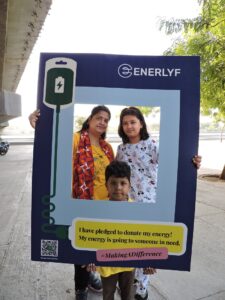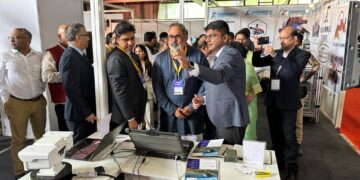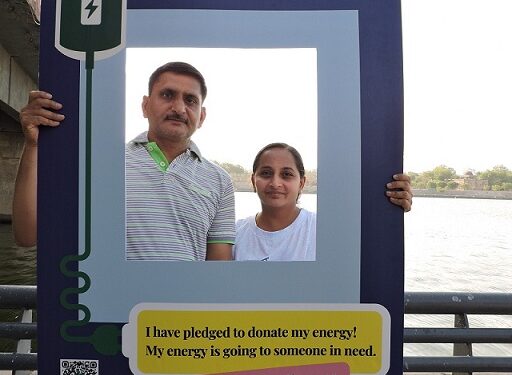Ahmedabad :In a pioneering initiative to empower communities and promote responsible energy use, Enerlyf, a Climate Tech company, hosted India’s first ever Energy Donation Camp on World Environment Day recently. The camp at Riverfront in Ahmedabad, Gujarat, focused on creating lasting change by educating attendees on fostering a conscious approach to energy consumption. In this regard, Chirag Panchal, Founder, Enerlyf gave important information about this camp.
While traditional donation drives provide immediate solutions, Enerlyf’s innovative approach is aimed at long-term sustainability with immediate results. The camp featured interactions with Enerlyf’s expert team. These conversations equipped attendees with practical tips on energy conservation, covering topics like creating the right set-up for efficient AC cooling and using AC in an energy-saving manner. Additionally, a pledge booth allowed participants to demonstrate their commitment to sustainability by vowing to watch their energy consumption and implement the learned tips.
Chirag Panchal, Founder, Enerlyf said, “The Energy Donation Camp exemplifies Enerlyf’s commitment to empowering communities and fostering a sustainable future. The company aims to create a lasting impact that benefits underprivileged areas and the environment by focusing on education, behaviour change, and collective responsibility.”

The camp specifically addressed the challenges faced by underprivileged communities. In many rural areas, power outages lasting for hours are a harsh reality. This lack of access to electricity, particularly during peak summer months when demand skyrockets by up to 50% due to air conditioning use, has a domino effect: Health Risks: Extreme heat without proper cooling can lead to heatstroke, dehydration, and other health complications. Loss of Productivity: Residents struggle to work or complete daily tasks efficiently without adequate lighting and cooling. Impact on Education: Children living in homes without electricity face challenges in studying and completing their education. Water Shortage: Inoperable pumps due to power outages can disrupt access to clean water, further exacerbating health risks.Psychological Impact: The constant struggle with limited electricity can negatively impact mental well-being,
The camp addressed the role of urban communities in mitigating the challenges rural areas face. Enerlyf’s experts encouraged attendees to adopt simple yet impactful energy-saving practices in their homes. These practices included: Raising AC settings by 1°C: This seemingly small adjustment can yield significant results, saving up to 6% on energy consumption. Sleep Science: Our bodies require a decrease in core body temperature in the hours leading up to sleep, promoting feelings of drowsiness. Conversely, a rise in core body temperature in the morning helps to signal wakefulness. Closing curtains during hot days: Blocking direct sunlight can reduce cooling costs by 10-15%. Cleaning AC filters regularly (every 25-30 days): This simple task not only improves efficiency by 5-15% but also extends the lifespan of the AC unit.

By implementing these easy-to-follow tips, urban residents can achieve a staggering up to 35% reduction in energy consumption. This translates to a valuable contribution that benefits not just themselves but also underprivileged communities.
The impact extends far beyond individual households. Enerlyf contributes to a significant decrease in overall energy demand on the power grid by encouraging a collective effort towards reduced energy consumption. This not only benefits underprivileged areas by potentially leading to improved power stability but also helps in: Reducing Greenhouse Gas Emissions: Less energy consumption translates to lower carbon dioxide (CO2) emissions, mitigating climate change. Environmental Conservation: Following the camp’s energysaving tips can save an estimated 3-4 units of energy per day. This translates to eliminating 2.5 kg of CO2 emissions per day. Supporting Rural Communities: The saved energy from a single urban household is sufficient to power 2.5 rural homes, supporting approximately 12- 15 people. This is equivalent to the environmental benefit of planting over 40 mature trees.




































